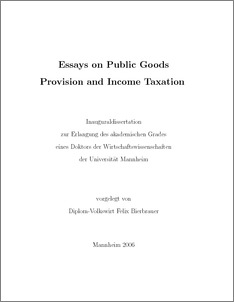|
Essays on public goods provision and income taxation
Bierbrauer, Felix J.
![[img]](https://madoc.bib.uni-mannheim.de/1305/1.hassmallThumbnailVersion/DissBierbrauer.pdf)  Vorschau |
|
PDF
DissBierbrauer.pdf
- Veröffentlichte Version
Download (1MB)
|
|
URL:
|
https://madoc.bib.uni-mannheim.de/1305
|
|
URN:
|
urn:nbn:de:bsz:180-madoc-13050
|
|
Dokumenttyp:
|
Dissertation
|
|
Erscheinungsjahr:
|
2006
|
|
Titel einer Zeitschrift oder einer Reihe:
|
None
|
|
Ort der Veröffentlichung:
|
Mannheim
|
|
Hochschule:
|
Universität Mannheim
|
|
Gutachter:
|
Hellwig, Martin
|
|
Datum der mündl. Prüfung:
|
22 Mai 2006
|
|
Sprache der Veröffentlichung:
|
Englisch
|
|
Einrichtung:
|
Fakultät für Rechtswissenschaft und Volkswirtschaftslehre > Finanzwissenschaft u. Wirtschaftspolitik (Janeba 2004-)
|
|
Fachgebiet:
|
330 Wirtschaft
|
|
Fachklassifikation:
|
JEL:
D71 D82 H21 H41 ,
|
|
Normierte Schlagwörter (SWD):
|
Öffentliches Gut , Optimale Besteuerung , Wohlfahrtstheorie , Einkommensteuer
|
|
Freie Schlagwörter (Englisch):
|
Public Goods , Optimal Taxation , Income Taxation , Welfare Economics , Mechanism Design
|
|
Abstract:
|
This dissertation is concerned with the characterization of schemes of taxation and public good provision that are optimal from a welfare perspective. The analysis is based on the assumption that individuals are privately informed about their valuation of the public good and that an optimal rule for public good provision reflects this information. As a consequence, an optimal provision rule has to be based on some procedure of information aggregation that allows this information to be acquired. The tax system is a key determinant for the task of information aggregation. If individuals are asked to communicate their valuation of the public good to "the system", they compare the utility gain from a larger level of public good provision to the utility burden that results from the need to generate larger tax revenues to cover the costs of public good provision. Individuals will hence communicate their "true" valuation of the public good only if these two forces are commensurate. These considerations demonstrate that the problem of finding an optimal tax system is intertwined with the problem of finding an optimal rule for an informed decision on public good provision. An analysis based on the presumption that information on public goods preferences just happens to be available is too naive. Individuals might refuse to reveal this information because a higher level of public spending affects their personal tax bill. This concern is the topic of this dissertation. Each chapter contains a characterization of optimal tax schemes and provision rules under the premise that information on public goods preferences needs to be acquired. A theory of optimal taxation and public good provision in the presence of uncertainty identifies outcomes that take specific constraints into account and are optimal under a given welfare function. Institutional constraints determine the set of tax instruments used for public goods finance. Technological constraints enter the analysis via the cost of public good provision that determines the tax revenue requirement in the public sector budget constraint. Finally, there are informational constraints. Individuals are privately informed about their public goods preferences. Hence, an optimal policy can use only those pieces of information that individuals are indeed willing to reveal to the system. Considerations of political feasibility enter the analysis via this latter set of constraints. Information can be acquired only if it is used in a way that is in line with the interests of individuals. These interests in turn are shaped by the tax system and the provision rule for public goods. The derivation of a normative benchmark that takes all these constraints into account is of limited use when it comes to recommendations for actual public policy. However, it provides a better understanding of their interplay and of the restrictions that become effective even under an ideal tax system. For instance, chapter 4 of this dissertation identifies a tradeoff between the desire to have an optimal redistributive tax system for a given level of public good provision and the problem of acquiring the information that is needed to determine the optimal quantity of the public good. It is shown that these two tasks can not be achieved simultaneously; that is, even the best policy-maker is not able to escape this problem. In more abstract terms, a theory of optimal taxation, public good provision and information acquisition yields a characterization of constrained efficient allocations. In addition, with a given welfare assessment, optimal constrained efficient allocations can be studied. As an example, it is shown in chapter 4 that a constrained efficient utilitarian tax system displays a complementarity between the extent of redistribution and the decision on public good provision -- relative to a situation where informational constraints are not taken into account.
|
|
Übersetzter Titel:
|
Aufsätze über die Bereitstellung öffentlicher Güter und die Besteuerung von Einkommen
(Deutsch)
|
|
Übersetzung des Abstracts:
|
Die vorliegende Arbeit fällt in den Bereich der normativen Finanzwissenschaft. Sie behandelt Steuersysteme und Regeln der Bereitstellung öffentlicher Güter, die aus Wohlfahrtssicht optimal sind. Dabei lautet die zentrale Prämisse, dass Individuen private Information über ihre Wertschätzung öffentlicher Güter besitzen und dass eine optimale Bereitstellungsentscheidung darauf angewiesen ist, diese Information verfügbar zu machen. Folglich setzt eine optimale Regel der Bereitstellung öffentlicher Güter einen Mechanismus der Informationsaggregation voraus. Das Steuersystem ist dabei ein wesentlicher Einflussfaktor. Individuen werden ihre Wertschätzung öffentlicher Güter nur dann wahrheitsgemäß enthüllen, wenn ihre Nutzen aus der Bereitstellung öffentlicher Güter und ihre Steuerbelastung in einem angemessenen Verhältnis stehen. Folglich kann das Problem einer optimalen Besteuerung nicht unabhängig vom Problem der Präferenzenthüllung für öffentliche Güter behandelt werden. Diese Arbeit entwickelt eine Theorie der optimalen Besteuerung und einer optimalen Bereitstellung öffentlicher Güter, die dieser Interdependenz Rechnung trägt.
(Deutsch)
|
 | Dieser Eintrag ist Teil der Universitätsbibliographie. |
 | Das Dokument wird vom Publikationsserver der Universitätsbibliothek Mannheim bereitgestellt. |
 Suche Autoren in Suche Autoren in
Sie haben einen Fehler gefunden? Teilen Sie uns Ihren Korrekturwunsch bitte hier mit: E-Mail
Actions (login required)
 |
Eintrag anzeigen |
|
|
